Foods that you should include in your diet if you are Breastfeeding
 18117
18117

super easy
The most natural, most comfortable way of increasing your breastmilk is to breastfeed your baby as many times and as long as possible. If you combine this with the intake of lots of water and a nutritious diet, nothing can stop you from becoming pro at breastfeeding! When it comes to food, here is the fact. There is no sufficient scientific evidence to state that healthy foods increase the breastmilk supply. The mothers who consume unhealthy food are also breastfeeding healthily. But there are several cultures worldwide, who believe in and practice feeding healthy lactating foods to new mothers. These are effective though there is no solid proof or evidence available. So, let’s check out these healthy foods you can include in your diet to improve your breastmilk supply.
Foods that you should include in your Diet to increase Breast Milk
The Herbs are there to help you.
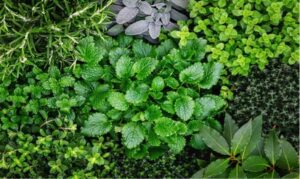
Image Source: gardenerspath.com
Fenugreek
Fenugreek is an annual herb with seeds containing pods and yellow flowers. These originate from Asia and the Mediterranean. Do you know why a new mother’s diet includes fenugreek seeds? Here is the reason. These nutritious seeds are rich sources of omega-3 fatty acids, which help in your baby’s brain development. These contain estrogen-like compounds, which believed to enhance your breastmilk production. You can include these nutritious fenugreek seeds in your roti, puri, tea, and savory dishes. Even though there is no significant scientific evidence for the effect of fenugreek on breastmilk production, few studies are in the literature. Mothers who consumed fenugreek tea could pump the milk almost double the volume in 14 days compared to mothers who didn’t drink fenugreek tea. In another study, mothers who consumed 600mg fenugreek seeds daily for a month could produce 20% more breast milk. Fenugreek belongs to the same plant family as soybean, chickpeas, and peanuts. If you are allergic to any of these food items, there are high chances that you may react to fenugreek as well. It is also found that few mothers who had fenugreek regularly made their babies gassier with bloating and stomach irritation. There are also cases where fenugreek consumption was associated with enhancement of asthma. So, listen to your body to determine any side effects.
Fennel
Fennel is a common herb that has culinary and medicinal properties. It is in use since the ancient Egyptian period. The fennel seeds are crunchy, traditionally used to improve the breastmilk supply. In addition to this, these are believed to reduce gas and colic. You can get the benefits of fennel seeds by soaking these in a glass of water for overnight and drinking it in the morning. You can also consume these seeds in the form of tea or powder that you can add to stews and soups. These estrogen-containing seeds are believed (because of some handful of studies) to increase the breastmilk’s volume and fat content and baby’s weight. It is also thought that the benefits of fennel seeds pass onto your baby through the breastmilk, but there are no enough researches to back these beliefs.
Blessed thistle and milk thistle
Blessed thistle is a plant native to southern France to Iran. These are characterized by their hairy leaves and fuzzy yellow blossoms. This herb is considered as a galactagogue, which stimulates lactation. It is believed to increase prolactin and oxytocin hormones. These boost the milk supply and release milk from nipples, respectively. But the recent studies dismissed the blessed thistle as galactagogue as the available studies couldn’t meet the necessary criteria. In contrast, milk thistle is believed to increase the breastmilk in India and Europe for generations effectively. It is a tall plant with purple flowers and prickly spines. This medicinal and healing herb originates from the Mediterranean region. Although there is no scientific evidence to prove its ability to increase the breastmilk supply, it has effectively increased dairy cows’ milk. It is believed that the plant estrogens are why some women had reported making more breast milk after consuming this herb. You can consume milk thistle in the form of tea, supplements, and food.
Goat’s Rue
Goat’s Rue is a herb native to the Middle East and Europe. You can consume these in the form of tea, capsules, and supplements. Only the dried leaves of these herbal plants are considered galactagogue and not the fresh leaves. You know why? Because the fresh leaves are toxic. In addition to increasing the breastmilk supply in nursing mothers, it is also believed to stimulate breast tissue growth. This goat’s rue’s property helps the women breastfeed who had breast surgery and who wants to breastfeed the adopted baby. Isn’t that interesting?
Stinging nettle
This herb, also known as common nettle, is a dark, leafy green plant. It contains a high amount of iron and is considered very nutritious. It is believed to enhance the breastmilk supply in nursing mothers. It is considered safe if you consume it immediately after childbirth. But this may be associated with the risk of an overabundant supply of breast milk, breast engorgement, etc.
Alfalfa
It is one of the oldest and most cultivated crops in history, originating from early Greek, Roman, and Chinese cultures. Since ages alfalfa is used by the new mothers to increase the breastmilk supply. The phytoestrogens present in them makes these plants galactagogue. But, not many clinical trials are done to support alfalfa’s benefit. It is also believed that alfalfa’s intake can cause diarrhea in both the nursing mother and the baby. If you are in anticoagulant medications, it is not recommended to consume alfalfa, as it contains vitamin K and may interfere with these medications. The use of alfalfa may also worsen systemic lupus because of immune system stimulation. Therefore, it is always recommended to consult your doctor or lactation expert. If you receive a green signal from your doctor, you can consume alfalfa in the form of tea, food, capsules, or tablets.
Holy Basil
It is an aromatic herb that has many medicinal and culinary purposes. Though there is no scientific evidence of its effect on breastmilk production, holy basil is believed to promote the breastmilk supply in some cultures. In addition to this, this herb is also known for promoting healthy bowel movements, good appetite, and calming effect. You can add this herb in your food; you can consume it in the form of tea or as it is with a cup of warm milk. It is always suggested to consume this herb in a moderate amount.
Garlic
Garlic is an ingredient that is found in many food recipes all over the world. It is not just flavoring for food, but it also has medicinal properties. You may have a question in your mind about whether you can include garlic in your post-partum diet or not. It is safe to include garlic as long as you and your little one can tolerate it. It is found that the consumption of garlic in a moderate amount has a tremendous positive impact on your health and your breastmilk supply. Garlic is a galactagogue used as a herbal treatment to stimulate breastmilk production and enhance breastmilk supply. It is found that the babies whose mothers consumed garlic stayed at the breast and breastfed for a more extended period. As you know, increasing breastfeeding can lead to an increase in the breastmilk supply. Lactation experts believe that this could be the reason for garlic increasing the breastmilk supply.
Dill seeds
Dill is a herb and is also considered as a spice. It is a rich source of calcium, iron, and magnesium. These are used in Ayurveda to promote appetite, aiding digestion, and increase the breastmilk supply. Dill is a diuretic; therefore, health experts recommend to consume in moderation. You can add these dill seeds as a whole or crushed into your soups, stews, salads, curries, cheese spreads, and pickles. Dill tea, dill vinegar, and dill dressings are the other products you can consider trying.
Don’t say NO to veggies.
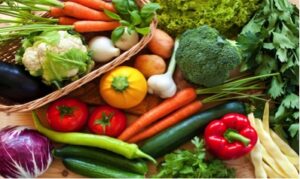
Image Source: www.britannica.com
Green leafy vegetables
The nutrients such as folate, calcium, iron, beta-carotene, dietary fiber, riboflavin, and bioactive compounds are found in green leafy vegetables such as kale, spinach, and mustard greens. These vitamin-rich vegetables are believed to enhance breastmilk production because of phytoestrogens’ presence. These not only help in the growth and development of your baby, but they also give detoxifying benefits. It is recommended to consume at least one portion of green leafy vegetables daily.
Carrots
The vitamin A-rich carrots are believed to boost lactation and improve milk production quality. You can include this nutritious food in your salad, or you can juice it and have it along with your breakfast. You can also make a healthy carrot and potato stew or eat them as a mid-day snack along with hummus. In addition to vitamin A and beta-carotene, phytoestrogens’ presence is believed to increase the breastmilk supply.
Bitter guard
When I say bitter guard, all that comes to your mind is its bitter taste. But if I say it benefits you will consider including in your diet. So, read further. This guard vegetable contains high water content, which keeps you hydrated. The anecdotal evidence suggests that the bitter guard increases the breastmilk supply. You can consume this easily digestible guard vegetable in the form of curry or baked chips. The other guard family vegetables such as bottle guard, apple guard, and sponge guard are traditionally used to increase new mothers’ breastmilk supply. These vegetables are not only low in calories but nutritious as well. So, don’t skip these veggies in your diet plan.
Moringa
The moringa, also known as drumsticks, is widely consumed in Africa and Asia. The pods and leaves are rich in nutrients such as calcium and iron. These nutrients are required for new mothers in post-partum recovery and to enhance breastmilk production. You can consume fresh leaves of moringa to garnish your food. You can also obtain the benefits of moringa in the form of moringa tea, moringa capsules, or you can add pods or leaves to soups, curries, and stews.
Beets
Beets are veggies with a high amount of fiber and healthy minerals. In addition to being a blood purifier, it is also believed to improve breastmilk production.
Give a chance to these seeds.
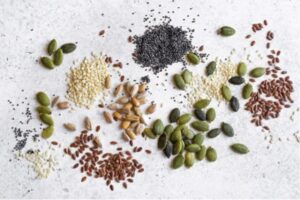
Image Source: www.scientificamerican.com
Cumin Seeds
You all know that cumin seeds are an integral part of Indian cuisine. But many of you may not know that these seeds help in lactation, including digestion, bloating, and acidity. These are a good source of calcium and riboflavin. You can use these cumin seeds in salads or soak them overnight and drink the water to get their benefits. You can also roast them and add them to snacks, chutney, raitha, etc.
Sesame seeds
If you are looking for a non-dairy source for calcium, then sesame seeds are there to help you. These help in your baby’s growth and help you recover after childbirth. But how these seeds help in increasing the breastmilk supply? Here is the answer. These sesame seeds contain phytochemicals such as quercetin and sesamin. These stimulate the secretion and improves the breastmilk supply. You can consume a teaspoon of sesame seeds in the lukewarm water, or you can add this to your daily food such as salad, sandwich, pasta, homemade snacks, or you can eat along with nuts and dried fruits, etc.
Flaxseeds
Flaxseeds are the rich source of essential fatty acids, ALA (alpha-linolenic acid), and other vital nutrients that are required for your baby’s growth and development. Like other lactating foods, flaxseeds are also believed to contain phytoestrogens that increase the breastmilk supply. You can get the benefits of these nutritious seeds by consuming roasted flaxseeds with warm water, adding flaxseed flour into stews and soups, or adding the flaxseed oil into your salad.
Pumpkin seeds
The pumpkin seeds are rich in protein, fiber, iron, and health-promoting bioactive compounds. In addition to these nutrients, you can also obtain enhanced breastmilk production. You can get the increased lactation benefits if you include pumpkin seeds or pumpkin seeds powder into your salad, soups, and porridge.
Poppy seeds
In Asian cuisine, poppy seeds are the common culinary ingredient obtained from the poppy plant. It is believed that these seeds can increase breastmilk production on regular consumption. You can add these seeds into your bread, cookies, confectionery items, pancakes, curries, and waffle batters to get their benefits.
Whole grains are among the right options; read on to know more.
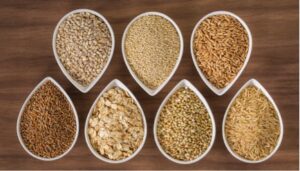
Image Source: www.healthyeating.org
Oatmeal
Oatmeal is one of the most favorite breakfast meals. But did you know it can also help the new moms increase their breastmilk supply? Yes, this fiber and energy-rich breakfast meal contain a higher concentration of beta-glucan, making oatmeal well-known breastmilk- makers. It is also believed that oatmeal increases the breastmilk supply by enhancing oxytocin hormone levels. You can include oats in your diet as a breakfast meal, cookies, muffins, cake, porridge, bread, etc.
Barley
Barley is considered as the richest source of beta-glucan. This polysaccharide is believed to improve prolactin hormones and increase the breastmilk supply in both animals and humans. In addition to boosting the lactation, it also keeps you hydrated. You can incorporate these grains in salads, soups, stews and porridge. You can soak these overnight and then consume the water the next day to obtain its benefits. You can use barley flake to make milk and include it in your homemade bread recipe. You can use barley in barley malt syrup, barley risotto, and barley flour to prepare pancakes, crackers, biscuits, etc.
Brown rice
It is a whole grain containing vital nutrients such as vitamin B, iron, magnesium, folate, and dietary fibers. It is suggested as a part of the new mother’s post-partum diet because it helps in weight loss and provides several health benefits. It is believed that brown rice stimulates the breastmilk production hormones. It is considered as a great source of energy. You can replace white rice with brown rice and notice its health benefits.
Fruits do have lactogenic effects.
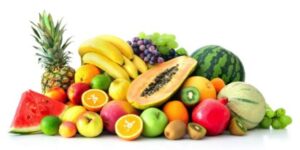
Image Source: www.diagnosisdiet.com
Papaya
Papaya fruit in raw and cooked form is used as a galactagogue in Asian cultures. This sunny fruit is not recommended during pregnancy, but it is used during nursing because of its lactogenic effects. It is found that both papaya and papaya leaf juice increase the breastmilk supply. You can incorporate unripe papaya in yogurt, salad, cereal, Thai-inspired soups, and noodle dishes. You can also include papaya fruit in your diet as a snack or add it to the porridge.
Apricots
The calcium and fiber-rich apricots are great in stabilizing the hormonal imbalances. These are suggested to consume both before and after delivery. These are also believed to increase prolactin hormones, enhancing the breastmilk supply. You can add fresh or dried apricots into porridge, cereal, and desserts. Do not go for canned apricots as it is very high in sugar.
Watermelon
If you have lactation problems, you can include fruits which are high in water content. One such fruit is watermelon. This fruit is rich in fiber and fructose. It keeps you hydrated, infuses essentials minerals into your body, and helps in increasing the breastmilk supply.
Grapefruits
Grapefruits are a rich source of vitamin A, C, fructose, and essential dietary fibers. This mega fruit is considered one of the healthiest additions that anyone can make to their diet. This addition is believed to improve lactation in new mothers.
Your favourite seafood is on the list too.
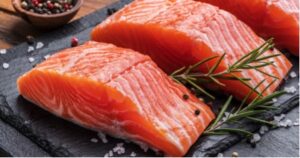
Image Source: thefishsite.com
Salmon
If you have access to the fresh salmon, just grab it. You ask why? Here is the reason. Salmon is a low mercury fish rich in omega-3 fatty acids, essential fatty acids, high-quality protein, vitamin D, and vitamin B12. All these nutrients help in lactation and make your breastmilk nutritious. I am sure; this reason is sufficient to include salmon in your diet. You can have this healthy fish in grilled, pan-fried, or steamed form.
Root vegetables? Yes, why not?
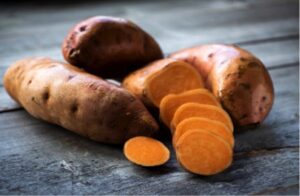
Image Source: snaped.fns.usda.gov
Sweet Potato
Sweet potatoes are nutritious root vegetables with a high amount of carbohydrates, vitamin C, B12, and magnesium. You can prepare various recipes out of this yummy vegetable, including sweet and savory dishes. Even the sweet potato leaves can offer a lot in your breastfeeding journey. These are the rich sources of micronutrients, fiber, and health-promoting phytochemicals. These are believed to enhance prolactin hormones level and increase the breastmilk supply. You can use these greens to prepare a tasty salad and stir fry recipes.
You got a new reason to eat the nuts.
Image Source: www.ft.com
Almonds
Almonds are superfoods containing calcium, protein, vitamin E, omega-3 fatty acids, and polyunsaturated fats. New mothers out there can snack on these tiny pockets of nutrients to enhance their milk production and breastmilk taste. The estrogenic property of these almonds makes them galactagogue food. You can consume almonds as a snack, along with fruits and nuts. You can also add them into the desserts, smoothies or use them in almond flour, almond butter, and almond milk. In addition to improving lactation, these also help new mothers to recover post-childbirth.
Include a complete food in your diet
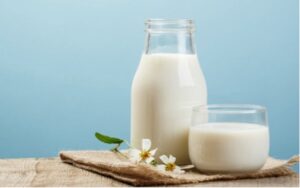
Image Source: timesofindia.indiatimes.com
Milk
As you all know, milk is a complete food containing nutrients such as calcium, folic acid, and healthy fats. If you want to enhance your breastmilk supply and improve its nutritional profile, then go for a glass of milk twice a day.
Legumes have to offer too in your lactating diet.
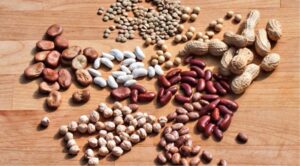
Image Source: www.thespruce.com
Chickpeas
You may be wondering what makes chickpeas a lactating food? It is because of calcium, vitamin B complex, and phytoestrogens. Since ancient Egyptian time, nursing mothers are using chickpeas. Chickpeas are nutritious, containing high-quality protein, micronutrients, and bioactive compounds. You can get all the benefits of chickpeas by adding them to your pasta, salad, soups, curries, and dips such as hummus.
Are lentils good for your lactation? Yes
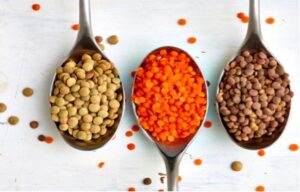
Image Source: www.thekitchn.com
Lentils are used worldwide because of their nutritious nature. Among these lentils, red lentils or masoor dal are considered the rich sources of protein, fiber, and iron. It is also believed to increase the breastmilk supply in nursing mothers.
Spice is excellent for your breastmilk
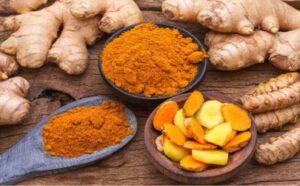
Image Source: tribune.com.pk
Ginger
Besides its medicinal and health benefits, fresh ginger is also believed to improve new mothers’ breastmilk production. You can add the pieces of fresh ginger to the food you cook daily. You can also consume it in the form of ginger tea. If you wish to consume ginger in the form of supplements, it’s always better to consult your healthcare professional.
Turmeric
You all know the culinary and medicinal benefits of turmeric. But there are few research pieces available showing that turmeric along with ginger and fenugreek can increase breastmilk production. You can add turmeric into your curries, stews, and soups and get its lactation benefits.
Other foods with lactating benefits

Tofu
Tofu is a soy product packed with vitamins, minerals, protein, and calcium. It can be a part of the lactation-friendly diet with lentils and green leafy vegetables. The presence of phytoestrogens makes it one of the best foods for maternal health and increases breastmilk production. Your favorite soups, salads, and curries can accompany this superfood.
Teas
If you are in a weight loss journey or detoxification process, you know the benefits of green tea. It is a rich source of antioxidants and minerals which relaxes your body. It also helps in purifying your body system. In some countries, it is believed that green tea helps in increasing the breastmilk supply.
Curry leaves
Curry leaves and their powder is used in Indian cooking to add aroma and flavor to food. These delicious leaves contain melanin compound which improves blood circulation and your body’s ability to break down the nutrients. These mineral-rich leaves are believed to enhance milk production in nursing mothers.
Brewer’s yeast
Brewer’s yeast or baker’s yeast is used as a nutritional supplement. Even though the evidence is unavailable, it is recommended as a breastmilk booster and incorporated into lactation snacks. This supplement is highly bitter and passes through breastmilk; it may result in gas or fussiness in some babies. You can include the brewer’s yeast in your baked goods.
Dates
As you all know, consuming dates as a part of your diet enhances your overall health. This benefit is all because of the presence of several nutrients and phytochemicals. Other than these benefits, dates are also believed to enhance the prolactin hormone levels and improve breastmilk production.
Conclusion
So, here is the list of all the fantastic lactating foods that increase your breastmilk supply and help improve your overall health. Even though these lactating foods have many benefits, health experts recommend consulting the doctor before incorporating any food ingredient in your diet, especially if you are suffering from type 1 or 2 diabetes, heart disease, or legume/nut allergies. I hope this content helps you manage the diet to improve your breastmilk supply. What foods you had or planning to include in your post-partum diet? Let me know in the comment section below.






Leave a Reply